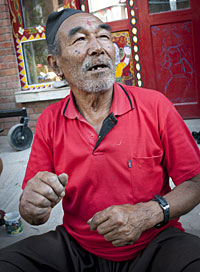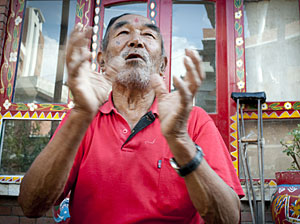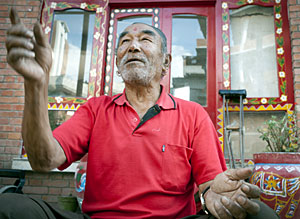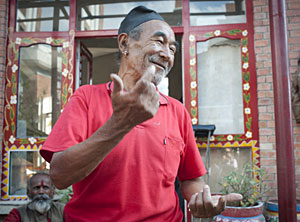 PICS: SALLY BIERMAN |
There are very few people with the sparkling, alive eyes of Chiri Bhai, the 82-year-old six feet tall farmer extraordinaire. There are legends about his magic touch at the Leprosy Center Shanti Sewa Griha, how he grows cauliflowers as big as basketballs, and carrots as long as your forearm.
Once a gardener at the royal palace, he became a consultant at Shanti's eco-village, teaching his way through what others call 'organic farming'. He himself has never heard of the term.
"We don't need another engineer or doctor who will take away that knowledge to work abroad," says the shelter's founder Marianne Grosspietsch, "we need good, sound farmers, craftsmen, aware of their heritage."
Chiri Bhai looks at US factory farming poultry, the way 99 per cent of chicken are raised in that country: dark, immense halls with stacks to the ceiling, non-stop artificial light for the first weeks to induce overeating, bones unable to keep up with growth hormones, beaks cut off to stop the chicken tearing at each other in madness, no sunlight.
 |
The old way of farming meant replenishing the soil's nutrients. Chiri Bhai remembers keeping lots of animals and using their waste, as well as night soil, for the fields. They used to dig down through the clay layers to bring out the nutrient-rich 'kalimati' and apply the black earth to fertilise the crops. Chiri Bhai says there is an organic solution for everything, even against insect pests. Soot scraped from walls of the house are the best insecticide, he says.
 |
Chiri Bhai is ambivalent about foreigners coming to help Nepal. "They come, they help, but they stay a short time," he says, "they don't see the long-term, how could they? Like kings they live in their own world. Nepali people are just a bit too devoted to them."
 |
Chiri Bhai has heard of hybrid corn, and doesn't approve. "Corn only for eating, not for planting, is not corn," he says matter-of-factly, "we treat all things as our friends. We cannot just eat-eat-eat. Maybe this year you get good harvest but who knows, there may be a shortage, the company will be unable to supply seeds, then what do you do?"
Asked why food should not be grown in this way, Chiri Bhai's simplicity cuts through all the moralising: "It just doesn't taste good."
Here is an organic farmer who is now also looking after lepers because he loves them. He helps them hang up the washing, does tasks they can't do because of their gnarled fingers. With his feet firmly on the ground, earth under his fingernails, and the sun constantly in his eyes, Chiri Bhai's existence is an extension of nature itself.
Bal�zs Sz�sz
Read also:
Leap sideways, BALAZS SZASZ
Nepal should leap neither backwards nor forwards, it should combine the two


